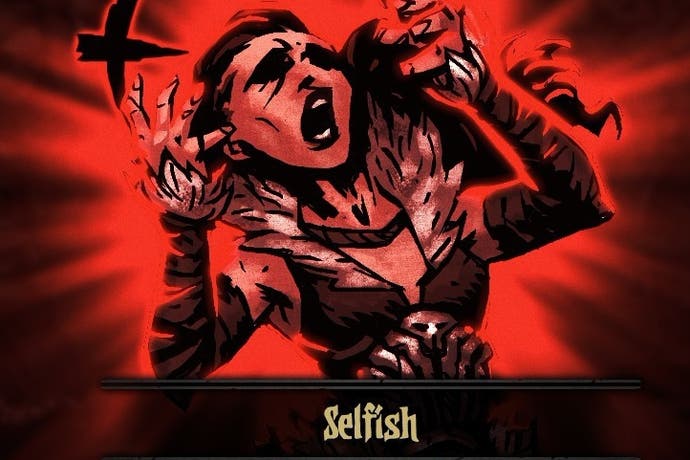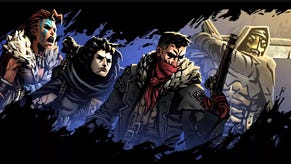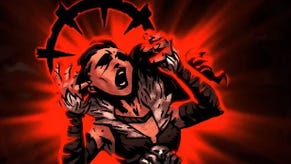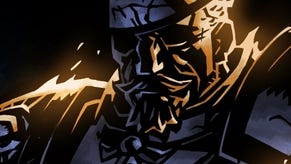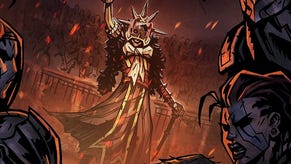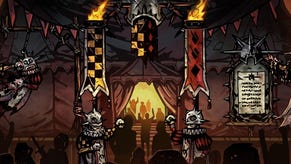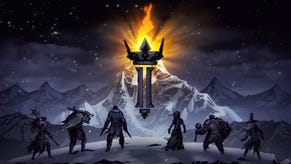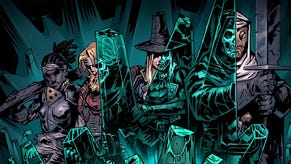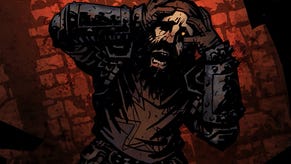Darkest Dungeon and the Lovecrafting of crunch
Going for broke.
Heroes aren't born, forged, plucked from obscure, charming villages or raised from centuries of slumber in Darkest Dungeon - they are broken in. Or at least, broken. Out on Switch today, Red Hook's festering roguelike sees you battling to reclaim a cliffside manor from the cosmic terrors unleashed by your dead, yet mysteriously talkative Ancestor, sending quartets of procedurally generated adventurers into the estate to slay eldritch creatures and gather the resources and experience you need for an assault on the mansion itself. Besides the usual stats, unlockable abilities and gear slots, each adventurer has a stress bar, which fills up as they weather punishments both tangible and intangible. The mouldering hush of a crypt might fill it up a little. A clash with a screaming pigman the size of a house will probably fill it up a lot.
Max out the gauge, and the adventurer will undergo a "resolve check" that usually results in an Affliction - the effects may include spurning medical attention while at death's door, or berating the rest of the party for missed attacks, raising their stress levels in turn. There's a small chance that the hero will discover hidden reserves of strength and acquire a Virtue instead, the effects of which range from massive stat buffs to random self-healing, but in general, such meltdowns are to be avoided. You won't always be able to avoid them, however. When not wading into the filth, characters can be left to recuperate at the local tavern and chapel, or treated of stress-inducing "Quirks" such as claustrophobia at the sanitarium, but the expense of such therapies, coupled with the unpredictability of the dungeons, make it impossible to keep everybody's blood pressure down for long.
Accordingly, the thrill of Darkest Dungeon lies not, as in other turn-based RPGs, with the delicate arranging and toppling of variables whose effects can largely be relied upon, but in rolling with the punches when somebody's morale gives way. It's a game about bending souls and bodies out of shape, then dealing with - and taking a certain morbid pleasure in - the fallout. This is a gamble your adventurers have no choice but to endure. Oh, they might slip your clutches for a turn or two, going AWOL after an all-night drinking session or departing on some grotty/mystic errand. They might refuse to serve with ungodly character classes like the Abomination, or beg you not to send them on quests above their level. But the one thing they can't do is up and quit. For all their warped predilections and frailties, their resentment and gibbering outbursts, they make perfect employees - and if all else fails, they are easy enough to replace, with new recruits carted to the Hamlet every turn.
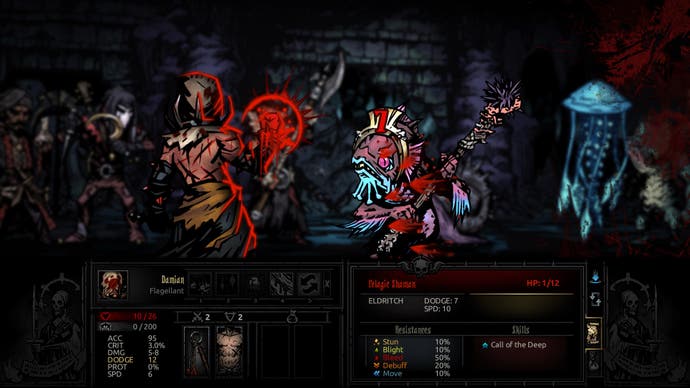
Darkest Dungeon's psychological elements are, on one level, a nasty joke at the expense of RPGs like Final Fantasy, where party members will happily square off against demons and dragons without a thought for their own survival. On another, they are a grotesque exaggeration of the strains of corporate gamedev, a parody born of Red Hook co-founder Chris Bourassa and Tyler Sigman's own time leading software development teams. The game's stress mechanics and lengthy list of mental illnesses aren't, of course, grounded in any serious clinical research, and shouldn't be regarded as any kind of manual for self-care. Rather, they are lurid metaphors for the way employees blow up and turn on each other when they're under pressure, coloured by H.P. Lovecraft's obsession with the line between reason and madness.
As Bourassa put it in a Gamasutra livestream last year, "you can push people on a deadline, and they'll get Afflicted and break down and stop coming into work, be nasty to everybody, or they'll really knuckle down, pull an all-nighter and get it all done, save the day, kind of thing. We just loved that ebb and flow." A little disturbingly, and in a way I'm sure Lovecraft would enjoy, the portrayal has infected reality for Red Hook. In a column for Polygon, Sigman describes learning to calculate his own emotional resilience in Darkest terms. "A day off after a hard week of work? Less stress. A couple beers out with friends? Stress likewise removed. Too many beers? Stress temporarily removed, will gain more stress tomorrow. Hit the gym? Stress removed and health increased. Dark Souls? That's a game, but it can add stress depending on your play style. No net gain or loss."
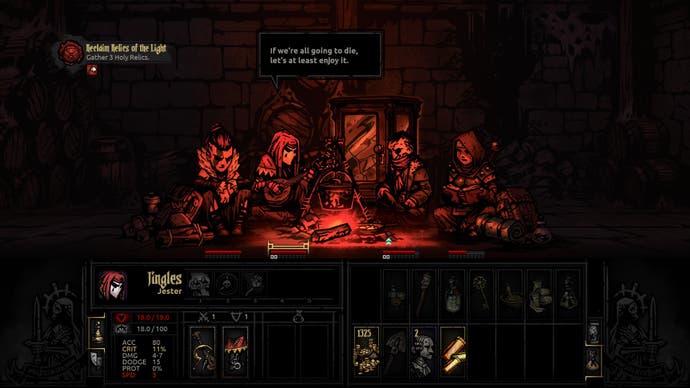
When I spoke to him myself about Darkest Dungeon's handling of stress, Bourassa observed that the ability to distance yourself somewhat from the emotions of employees is all part of being a leader. Nonetheless, it's hard not to see in the callousness the game requires of you and that fixation with breaking points a critique, specifically, of the games industry's romanticisation of toil.
According to the latest International Game Developers Association survey, 51 per cent of developers experienced "crunch" periods of unhealthy overwork in 2017, with 44 per cent working long or extended hours and 14 per cent reporting 70-hour weeks. Such gruelling spells at the coalface may come at the cost of mental and physical well-being and family relationships, and while some will of course slave away for the love of it, many feel they have no option but to go with the flow, for fear of endangering their careers. This is a predicament intensified by sheer uncertainty, with two out of five developers of the view that there is no "clear career path" in games development. Fair enough, I've yet to hear of any junior designer contracting hieromania or the Black Plague, but strip it of all those Victorian ailments, swinelords and cobwebs, and Darkest Dungeon is a mirror for this blend of exhaustion and insecurity.
Darkest Dungeon is fully aware that it is an enormously cruel game. Every facet of the stained and chiselled art direction and every wriggle of the audio design drips with mocking malice. There is a sepulchral narrator, voiced with odious panache by seasoned Lovecraft voice actor Wayne June, who urges you to ever greater feats of stony-heartedness while taking a ghoulish delight in your setbacks. "Trouble yourself not with the cost of this crusade," he assures you at one point. "Its noble end affords you broad tolerance in your choice of means." Whether you take that message to heart may reveal more about you than whether you're any good at the game. Darkest Dungeon encourages you to abuse the people who work for you, but it also wants you to recognise yourself as the villain.
